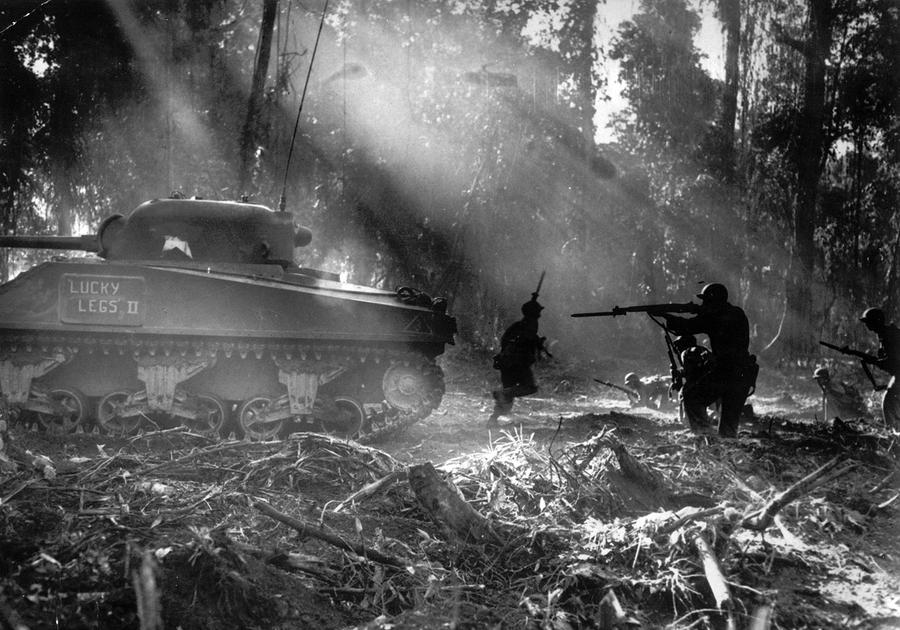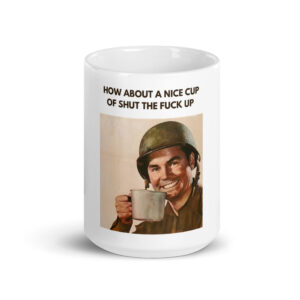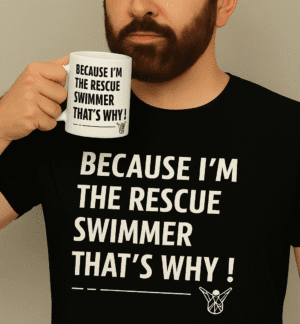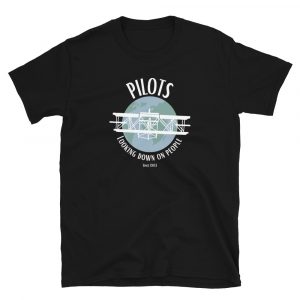Don't miss our flash to bang SALES!
Corpsman Bob Bush – Medal of Honor
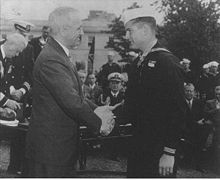
Question: Well the first thing, and again, you can just — you can answer to me. The first thing that I’ll have you do is just state your name, what branch of the military you served in, and what your rank was when you got out of the service.
Answer: My name is Bob Bush and I served with the Marine Corps in World War II. I was a Navy Corpsman. Our job was to take care of the Marines during their battle times and I discharged from the United States Navy in the fall of 1945 and my rank was hospital apprentice first class, USNR.
Question: Now how did you get into the service? Well, let’s start with when did you get into the service?
Answer: You know, as a young man at Willapa Valley High School at Menlo, Washington during the war years, there was a lot of people that just were — were pumped up on going into the service because of Pearl Harbor and this is in the early part of 1942. And of course I’m an 8th or 9th grader at that time. By the time my turn came up when I was 17, I would either go into the service or I’d wait until my 18th birthday and then you were drafted. And the drafter might put you in the Army and my mission was to do what I could for the war effort as a Navy seaman, and I had very little education just leaving high school and went back after the war and finished that. But during this I got transferred out of Navy medicine into the Marine Corps as part of the Navy medical procedure. So I — I actually left high school — wasn’t too smart there because I hear a little class at Willapa Valley up at Menlo had about 30 kids in the class and all of the boys were gone, all that was left was girls. And I wasn’t smart enough to stay there. So you can see I was a little immature. But they trained us and we — we got the job done.
Question: So where did you do your basic?
Answer: I — after enlisting in Uncle Sam’s Navy in 1943, I went through the first company of 1944 at Farragut, Idaho. During that course of boot camp, then you made the selection of what you’d like to serve in as far as the Navy. And because my mother ran a hospital in Raymond, Washington and my sister and I lived in a hospital, the Hospital Corps came into the picture and my address showed the Riverview Hospital in Raymond, Washington, so automatically I kind of went into the medial Corps because of that.
Question: Idaho?
Answer: In Idaho. How they — how the procedure was of training a Navy medic that could be trained well enough to — to service combat Marines in World War II, it took about a year. And the procedure was you’d go through hospital Corps school first and then you would transfer to intern at a Naval hospital some place in the country. Mine was Naval Hospital, Seattle. During my stay there then you would spend one week in each ward. There was 26 wards so you’d have 26 weeks. If any ward you couldn’t pick up on what’s going on in that ward, continuing your medical education, then you stayed for a second week. At the end of that period then you were selected either for sea duty or for the Marine Corps duty. I was selected for Marine Corps duty and then transferred to Camp Pendleton at Oceanside, California where we went to field medical service school. And at that school we learned how to fire weapons and how to — to treat people under battle conditions and you stayed there till you got that. And then on your 18th birthday, you shipped overseas. There was a very heavy shortage of medical support for the Marine Corps during World War II because of the many battles going on in the South Pacific.
Question: So where did you — when you first went to where action was, where did you ship to?
Answer: I shipped out of San Diego and went to Pavuvu in the Russell Islands where we staged an invasion coming off an invasion of Peleilu and then staged the invasion of Okinaw
Answer: And we did that training on Guadalcanal, on Peleilu, on Tulagi, on many of the South Pacific islands and they literally built the island that we were going to invade out of wood and they built the sea wall so that when we hit that beach it was exactly what it would be. Now nobody in the group knew where we were going to invade but they knew we were going to invade someplace. And the speculation was that it was Formosa, which is now Taiwan, but at that time Okinawa was a word that was never mentioned nor I think no one knew even where it was. But after the training completed, then they put us on a LST, that’s a little landing ship that carries 500 Marines and armored amphibious tractors and the bow doors open and the tractors go out and they turn in circles and then they make the invasion. Well, during this training on Guadalcanal, we would do it over and over and over, seven days a week, until we got it down to where when our turn came up, that our landing craft would hit the beach and then we’re on our own. We had — at that point in time I had been assigned one platoon, 58 men, to take — to keep healthy. And my mission was to keep as many men and as many guns as long a time as possible. This decision-making process for an 18-year-old Navy Corpsman, you would think might be kind of difficult, but it really wasn’t. It was, if they were able to fight, they stayed, and if they weren’t, they went back to the rear.
Question: So the landing crafts — where did you launch those from? You didn’t travel long distances in those, right?
Answer: Well, we — we launched, yes, we did. We — the landing craft is called an LST, ours was Number 950, and it left from Pavuvu in the Russell Islands and — and drove all the way to Okinawa, which is six weeks at sea, and maneuvering around other — you were — you were trying to get together where you could become part of the 1,700 ships it took to invade that island. And our particular ship happened to be the first wave. And our armored amphibious tractor happened to be the first one, almost, on the beach, and so that we were — no one was there before we got there. And the 32 days that I spent on that island, I don’t recall anybody being in front of us. Our unit was an assault unit, the division, the First Marine Division, was assigned as completely expendable, so that we — we knew we were in deep trouble there. So our — our mission as it was was to invade this island and secure it, but it was — we were just one little spoke in a great big wheel of 1,700 ships and — and we had 80,000 men. We spent 20,000 men on the first day to get them ashore. And then from then on we cut the island in half then we started invading toward the south. And I lasted 32 days on the island.
Some of the best reads on the Medal of Honor recipients and there stories are these four books
Question: Wow. So in the — and again some of the terminology I’ll be up on — the military — the tractor vehicle —
Answer: Armored amphibious tractors.
Question: Armored amphibious — how many men are in —
Answer: There’s three squads in an armored tractor, which puts you about 54 men. And this was — my platoon was in that tractor.
Question: So are you in there with pack, gun, whatever?
Answer: Everything loaded for bear. You’re there to make the assault. You have everything that you’re going to carry, all your food, your sleeping, your sanitary equipment, my medical facilities — gear that I used for servicing my wounded people was all — you carried it all. But you did a lot of practicing and you were in good shape. You were fed pretty well. You were well exercised. You were — your morale was very high, you knew that you could do the job. You were trained as well, and it’s amazing how a young person can get that training in that short a period. But I felt very comfortable that I could handle any task in front of me at 18 years old.
Question: Do you remember your first landing?
Answer: You bet. I — I — I was asked the other day by Tom Brokaw, what did you think when you landed on Okinawa on the beach 40 years after you went there. And I says, Well, Tom, you know, I — you asked me something and the first thing that comes into my mind — I remember leaving the LST and heading for shore in that armored amphibious tractor and then we made many circles around, then we got in a skirmish line to head for shore and I noticed that our tractor was going faster than everybody else’s tractor. So I told the squad leader, why don’t you have him slow this thing down. We don’t want to be the first ones there. And that’s — that was my answer, because I — I — and it actually — how I felt when I got back on the beach after 40 years. Same beach which was now a row of beautiful homes overlooking the ocean.
Question: So when the amphibious hits, do they open up right away and you disburse out?
Answer: No, the armored amphibious tractors are an armor..- they’re just a twin engine, diesel engine tractor that — that goes through the water and it has mounted on the bow two 50 caliber machine guns that sprays in front of you cause you’re the first wave so you’re knocking anything down on the beach in front of you and then when you hit the beach, the back drops down and you go out of the back. The early ones in World War II, you went out of the front. They were wood crafts. The later ones were steel, and this was late in the war, the spring of 1945, and they were — they were heavily armor plated, they were powerful, and then they would go back to another — another ship and pick up another load and bring the second wave. And this would go on until there were probably 30 or 40 waves that would land during the course of the day starting at dawn. We were the first wave.
Question: So when you got let out of that, where did you head? Fox hole or —
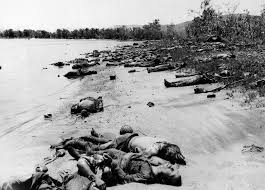
Question: So prior to landing on that beach, less than a year prior to that you were a 17-year-old kid in Willapa Harbor?
Answer: Willapa harbor high school, Willapa Valley High School, right. And I — I worked hard in my medical training, not because I really liked the work, but we got paid 54 dollars a month when I went into the service in the Navy in 1945, and had we get the next step up which would be from second class to first class, that pay goes from 54 to 78 dollars, and believe me, I needed the money. So I worked like the dickens and I — I made that next jump and I got the 78 dollars and then from then on it was — it got rather interesting to me and so I worked at it. And I did have some other advantages, too. And my training at Camp Pendleton, California in that same era prior to going overseas, they trained us in small arms. And had I not been a hunter in Willapa Valley and pretty — pretty wise to the woods and so forth, I probably wouldn’t be sitting here. Because that training helped me, and then the Marine Corps training in small arms saved me as I went down the road on that island.
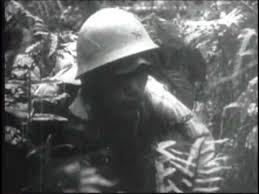
Answer: Hand to hand combat with the Japanese. And this, you know, you’re — you’re pretty close to them at all times when you’re on the front — first wave, and you’re in an assault company and you’re assaulting a hill or a valley or a plain or rice paddy or — you’re fighting the Japanese all the time. They’re an organized enemy that’s qualified and they’re fanatical and they were very difficult to fight because life meant nothing to them. To us it meant a lot.
Question: You saw them, they saw you.
Answer: That’s right. We saw them and they — I — I would see them and they would see me and we — I went on for 32 days with a great deal of success in my mission of keeping these guys fighting. We were losing a lot of people and we did a lot of things that –. I had an occasion the other day, we had a reunion up at Seattle that they — a little hotel there, the Doubletree. And one fellow came up to me and he said, “Bob, do you remember me” I said I’m sorry — “Curtis Smith is my name.” I said, “Curtis, I can’t place you.” He said “Do you remember that we had breakfast on Okinawa together?” I said, “Curtis, I can not only remember the morning we had breakfast, I can tell you what you were eating. You were eating a can of beans and you had the lid off of it and you were just digging in with a spoon.” And my mission that morning as I did every morning, is to go around to each one of these Marines and give them a little tablet of Atrabrine to keep away the malari
Answer: Now all this did was turn them yellow, but it would retard malaria so that they would be able to continue their effort of what they were there for in the beginning. And at that point in — that morning I was at Curtis Smith’s stage in my platoon and I threw the tablet in his mouth and he drank it down and I stand there till I see it go down because otherwise they’d spit them out and then they’d get malari
Answer: Then I’d have to treat them and we’d lose one more man to, not to the enemy. And that was a no-no. I said, Curtis — we were standing alongside of a pig pen and Curtis had driven up from the east Oklahoma home, Texas-Oklahoma border, in a station wagon with two dogs to tell me this story. And he said “I want to buy your dinner because you saved my life, Bob.” And I said — I thought about that and I said now I recall. I was looking over your shoulder and I saw a Marine Corsair coming in with his six machine guns going over the top of us heading down in the valley that we were about to assault. And I noticed he let his 500 pound bomb go too early. And my little calculator in my head said that bomb is back there; it’s not going to hit out there where it’s supposed to. It’s going to land here. So I hit Curtis and over the pig pen wall we went and I landed on top of him and he said, “I thought at that time, I wonder what I did to that SOB and then the bomb went off.” So he said, and you and I both got up and we were shaking our heads. And he said, “I drove up from Texas to buy you and your wife dinner because you saved my life.” And I said Curtis, I never saved your life, I saved my life and you were in the way. So, but we did have dinner that evening, and that was a kind of a story. This happened just last year after 50 years so it’s — and I would have never known him. But it was one of those things that happened during the war. We both couldn’t hear for a couple of days, but the pig pen was made out of concrete and it protected us from the fragments and we bounced around a little bit and I — I didn’t even write it up. It was an insignificant event of the — of the action that was going on at that time.
Question: Just another day —
Answer: Another day in the — in the trenches.
More amazing history about the War in the Pacific
Question: Now you say you spent 30-some days —
Answer: Thirty-two days on the island — I spent 32 days on the island of Okinawa and on the last — the last day that I left there, I — it was an interesting story because we — and the way the Marine Corps is made up, they have seven people in a command post when they’re running a platoon. And the Marine Corps runs their business like call the system of three. They have a fire team of three, the fourth being a team leader. They have a platoon of three squads, the platoon leader being the leader of that three squads. They have a company made up of three platoons and they have a battalion made up of three companies and then they have a division, and it’s always run by a system of three. So you’re reporting, really if you’re in charge, you’re reporting to three people. They are reporting to you. So in this case our military system of management was such that — that I — my job, of course was to take care of these guys and see that they were able to fight all the time and not get them to where they would — for one reason or another, elect not to be fighting. This never happened in the Marine Corps. For some reason, during that era, everybody was pulling together. Whether it was here on the home front or whether it was overseas, but you had a helper on both sides of you, everybody would — would literally lay their life down for you if they had to. But this command post I spoke of early, made up of these seven people, included the corpsmen. So I could listen to what was happening. And it was coming down from the division to the battalion to the company to the platoon. And the platoon said that morning we were to invade a certain hill at a certain time. Again the Marine Corps operates on — on orders. If it says do it at a certain time, you do it. And nobody questions it, they just do it. But this — this moment our platoon leader questioned that as maybe there wasn’t any Japanese on this hill. The platoon sergeant who had many years experience in fighting the Japanese in World War II — he was a little guy from Staton Island, New York and he had kind of a little shoulders and a big body. He didn’t look like a Marine, but he was all Marine. He was really qualified. And he suggested to our platoon leader that we should have the New Jersey, which was laying alongside, fire into this hill with some 16-inch guns to knock it down enough to see if there was any Japanese in any high volume of density there. That didn’t happen because the platoon leader elected to take a squad out in front of the other two squads that were in reserve and look at the situation. Well, me as a medical corpsman, not knowing anything about military tactics, know that that’s the wrong thing to do. Here you’ve got support and your full platoon and you take a third of the power — it’s like trying to run your car with two cylinders. And they go out there and they get into an awful mess and at that time the platoon leader is wounded. Now I have — I have a decision to make at that point. It’s either I go out and help him or I stay home and protect myself with the other 36 guys that are with me back at the ranch under orders to stay there until he gets back. So I elected to go out and help him, as I had been doing. And as I told him later that maybe I wouldn’t do that if I had another thought or another chance to go or no go, but I did go out and I found him in a shell hole and we were — he and I were about the only two living things out there, along with the Japanese Army. And so I’m working on him and he said the first thing to me, there are no nips here doc. And I said Jim — Roach was his name — I said Jim, they’re all over the place and if you just hold on here, I noticed his eyes were dilating and so he was slipping away from a loss of blood, but he — he had no internal hits. He was hit on the shoulder. Didn’t get his jugular vein but it got his shoulder and his collarbone and so forth, not too serious, and really not life threatening at all. So my thing was, I will patch him up and get him — I put some albunim in him which is a sugar-dextrose — it’s like blood plasma in World War II. Put that in him, got him going, in the meantime I see his rifle laying there so I pick it up and I push the button on the clip release and I put my thumb on the rounds and I’m looking all the time at this hill about 20 or 30 feet away from me. And I can see a head come up now and then — it’s a Japanese soldier. And you know, scared the absolutely — you think I’m scared, I’m scared to death. So I — I keep thumbing this thing and I put it back in and now I know I’ve got a carbine that fires semi-automatic and it’s got 15 rounds that are ready to go and it’s got 30 more in the stock so I’m armed. And the next thing, I feel a little tug on the bottle and I — when I do that I let go and I look and I had given this Marine lieutenant enough uppers to get him going and he ran across the field. Well, that was okay except he gave away my position. Now I’m in the hole here, I’ve got two things to do. I’m sure not going to go after him because when he run away, of course, that exposed him to the Japanese that were right in front of us. So I took the carbine and I — every time I’d see a head come up I’d fire at the berm. And I’d fire only one round, continually thinking that I’ve got to conserve ammunition. And I hadn’t had a scratch yet — I’m still in good shape. But one of those guys up there, picked up on me and they threw a hand grenade down and it — as soon as it hit the ground I threw my arm up like this and I carried a 45-caliber pistol in a shoulder holster right here. And when that hand grenade went off it went into the weapon which protected my heart, but it took out one eye and it blew me up pretty well. I ended up getting hit with three of them. But in the meantime, before they got to me, I did a lot of damage up there. And I was so, then for some reason, and I don’t know. I had to be a sight for sore eyes, but for some reason I decided that I can’t go up the hill after them, and I’m a one-man Army, you know, I’m it. And so I — I look around, there’s nobody else there. So I go around the hill. And by doing that, I have the element of surprise on my team. Another, with the help of God and a few Marines, this happened. But I — I got around and I got up to the ridge where the Japanese were and they didn’t know I was coming. So I got, I had that element. So I neutralized them. As soon as that was over with, I looked around and I saw four more — some more over in one corner and I went over there and all I saw was their backs, because they were looking over a hill that I found years later that there were four of our Marines out of that original 19 that went out that had went down over the hill to get away from this influx of the Japanese. And how the Japanese got there and with us not knowing it, they had drilled holes in this mountain and they had literally lived inside the mountain. And it wasn’t a very big hill, but it was big enough to house 20 of them. And then they’d drill horizontal kind of tunnels, they’d lay in there and we’d throw in white phosphorous grenades, they’d come down, do no damage at all, then they’d come out and nail the Marines. So we lost an awful lot of our guys — I think it was 10 or 11 that day of that 19 that went out. But we were able to save Roach, because he was going across the field and I’m fighting the enemy so there was no problem on me keeping their attention up where I’m at so they didn’t have their attention on him. So I was able to do that just by luck and by good training, I think had a lot to do with it. There was no thinking that went into it at all. It was just reaction to training, I think, I look back at it that way.
Question: During your 30 days on the island, were you constantly on the move?
Answer: We — yes, we were. You know, you’re an assault company and they’re made up of people that are trained in that assault procedure. So that they’re always the first ones there; they’re always the ones that take the brunt of it, and how I got in that group I haven’t quite figured out but I did and I don’t know whether that was good or bad. But I served with mostly people from the South. And it’s interesting because during that era and I think even yet today, the people from the South like to get into the service and the people from the North like to get out. Now, I — that — me being — I made this very clear to my platoon that I was a Yankee. And of course they think the Civil War’s still going on. So I had to be kind of careful. But one of them said, “Doc, you’re not a Yankee because Washington State wasn’t even a state in 1863.” So I — I — they made me a Southern sympathizer. So I served with wonderful bunch of guys, very dedicated, very capable, very qualified, and we still get together today, 50 years later. I think there’s nine of us left out of that original group. So it’s interesting. And we — we’ve kept together all these years. But the activity that we had during the course of the battle would be some lulls but most time we were moving every day in some manner. And that’s a mission given by — by the platoon leaders down through the platoon — or the companies, down to the platoon, to where we might be protecting a radar hill one night but the next day we’re out doing something else. You know, a lot of patrols, a lot of — of not too much food. We were short on food. I recall one time we were just about out of it and we found a wild pig and I was an old butcher from Willapa so we butchered the pig and cooked it and everybody ate and if you have the diarrhea in those days we used Bismuth and paregoric. And we — it took two gallons to get them back fighting again. Everybody had the diarrhea — it was — there was quite a few questions, what happened to the 3rd Platoon? But that’s what happened — they ate too much pig that was not properly prepared. But so there was a little humor along with it, but you have to have a little humor in those — those conditions. It’s — it’s hard today to look back at that kind of a battle and the mammoth size and they, even at that late in the war, they shipped those ships from the West Coast of the United States and they went directly to Okinaw
Answer: So they were all coming together at the certain time, which would be the — about the 30th day of March, 1700 strong.
And then we had a — another thing in World War II that — that created an awful havoc and cost an awful lot of lives and it was the problem of the Kamikaze fighter plane. This Kamikaze was an airplane built by the Japanese; it was a flying bomb and it was untrained pilots were put in them and they’d send them out 1,200 at a time and they’re attacking 1,700 ships. Well, you could understand the havoc they would raise, even with our ability to knock them out of the sky, they would still make their mark. That made this battle, the Battle of Okinawa, the only battle in history where the Navy lost more people than the Marines. They — they’d hit a ship like the Bunker Hill and 1600 would die. The Franklin, 2000 died. There was many carriers that were hit because they were told to hit capital ships. Their powers to be should have told them to hit troop ships. That would have taken away the ability for us to fight. But the capital ships didn’t take away because they had already done their job. The airplanes were already off the deck. But they — they did the damage and that. So with this mammoth amount of involvement and the tremendous amount of death around you, it — you lose a lot of weight. And you had very little sleep and everybody stood watch every night so it was — it was a historical event and something that I don’t think I’d like to go through again, but I wouldn’t trade it either. It was — it was an interesting time, but believe me, from — everybody, my kids and my grand kids, they have a little trouble — that growing up from about 15 to about 18, but in those years you had no trouble because you were pushed into it, you were rapidly trained and you were — it was thrown upon you, and the area of responsibility — came home very quickly.
Question: You started to touch base on it — sleeping. When you were on the island, 30 days or whatever, what was kind of your day, sleeping, not sleeping, nights, setting tents, not setting tents, what —
Answer: Well, we — we — the Marine Corps operates, I think, a lot different than the Army. They — they move and hit and move and hit and I think that’s about the procedure. There never was a tent put up in the whole 30 days. It’s just — you just dig a hole at night to go to sleep in. And you cock your 45 and you — if nobody comes around, then you get as much sleep as you can. Everybody in the platoon, and this, of course, you can expand it through the 20,000 men. But they all do the same thing. Everybody at night goes to bed, sleeps as much as they can, and sometime during the evening he gets called upon to man the sound powered telephone that tells what’s happening from the company standpoint that’s sent down from the division through the company into the — the platoon. And if somebody calls you have to be on deck to answer that so you’d typically stand watch one hour a night. However, I stood watch two hours a night. Reason for that is that we did it with two people. So each of us had an hour but by doing that, you’d have them back to back so that you could have your 360 degrees covered with four eyes, and you couldn’t see too much at night but you could hear and we had, in World War II, late in the war, they came out with a sniper scope. And that was a scope mounted on a Springfield rifle that you could literally see at night, things move. And of course you knew that anything in front of you was the enemy. Anything behind you was our people. And you had to be very, very careful to have a target before you — we had snipers that used those. We had a snooper scope that mounted on a 50-caliber machine gun. And so that, too, was used with discretion. But when you had some noise coming at you in the evening because the Japanese had a habit of attacking at night, because there again life didn’t mean too much to them. So we would — we would move from, from one area of assignment to another. And when I was wounded and had to leave the island, we were about half way secured. It was May 2nd, that would be 32 days after the initial landing, the island was secured on June the 18th. Now the Japanese Empire knew that island was lost on May 12th and uh, history has depicted this. But they didn’t stop the fighting. They just kept right on fighting. The disadvantage to that, is today on Okinawa there is a wall similar to the one we have in Washington for Viet Nam that has 273,000 names on it. That’s all the names that they had of the Japanese people that died on Okinaw
Answer: Now these were Japanese, Okinawans, Filipinos, they were Chinese, they were slave labor, and they had all these names now. The total amount of people that died in that 82 days of fighting on Okinawa was 310,000. I’ve been asked time and time again about what do I think about the atomic bomb. And believe me, after being — going through that out there and seeing that you kill more people on one island than both atomic bombs did and the atomic bomb stopped the war. And had we used the same number on Okinawa and compiled that with the amount it would take to invade Japan’s homeland, the death toll would have been in excess of 20 million. And we would have lost two million Americans. So these are all calculations done by facts of history. And I’ve been a strong advocate of it, if you don’t know where you’ve been, it’s going to be pretty hard to get to know where you’re going to go. And so history has got a very important part of my life and I think it’s important for the young people to think — keep in mind that those that came before you learned a lot on their trip and it’s nice to learn from them so you don’t have to invent the wheel over again.
Question: Where were you when victory was declared?
Answer: I — after May 2nd, and of course the war being over on August 6th of 1945, I had a mission in mind was to get back home and get back in school for the fall of 1945. I went to the evacuation system of Okinawa, how it worked and worked on all the islands in the South Pacific. You’d leave the island, you’d go to a battalion aide station and they’d do what they could with you. Then you would move yourself out into a — they would move you out into a hospital ship. You’d go down to Guam. From there you’d fly to Kwajalein, then to Pearl Harbor. You’d stop at base hospitals in each one of these stations if you needed to and then you’d end up at Oak Knoll Naval Hospital in Oakland where I ended up on June 18th of 1945. I stayed there until July 26th, when I was discharged. And I — the reason I was able to get out so quickly wit severe wounds is that I lived in a hospital. And I told the people, I can get medical aid up in Willapa Harbor Washington, Raymond, Washington, where I may not get it down here. But I could also get my plan to get back in school. So this worked out well because the commanding officer of the Naval Hospital, Oakland, said that’s fine, so he let me out and signed me off and I was through with my military service and back to school I went. So on August the 6th when the war was over I was working in a sawmill in Raymond, Washington. And I — the word came down that the war had just completed. So I said to myself, you know, I was looking for a job when I found this one, so I think I’ll shut the mill down. So there’s a whistle tooting they used to shut the mill down for noon and for smoke breaks and things they had in those days. So I went up and tooted the whistle, shut the mill down. I thought well, I’m sure — I’m sure Emmett Anderson going to fire me over this one but I’m going to do it anyway. So I did and he — he didn’t fire me. He — they had a celebration that was second to none in the history of our little town for two or three days because the war was completed because everybody was part of the war effort.
Question: You kind of started to touch on this a little bit. What — what’s the message that you think. Well, first of all, let me ask this. When you were over there on the island, did you realize at the time that you were part of history?
Answer: When I was over on the island, history wasn’t too important to me. I think I more realized something that Ernie Pyle, who incidentally was with us a few days before he died on a little island called Ie Shima, just off of Okinawa, but he was a combat correspondent of World War II and the dean of combat correspondents, I might add. He’s buried out at the Punch Bowl in Hawaii. But he made a couple of statements and one that stayed with me a lot. That the war is only 100 yards on either side of you. And this is — this is really true. There’s no — your main concern is old number one in your group. He also said that you feel very humble amongst dead men and that is also true. I mean, you’re – you have friends one day and they’re gone the next day and you have to adjust for this. And today it would be kind of hard to say, well, how do you feel if you have to shoot somebody. Well, you have to feel and the way I felt is that I never had too much animosity toward the Japanese although they killed a lot of my friends, because I did more to them than they did to me. And I felt that justified me, and I felt that way. I still haven’t brought myself to buy a Japanese car. But other than that I’m — I’m — I have a lot of Japanese friends and it’s — but war is hell. And you don’t want them any way you can cut it. I just don’t think of anything else for young people that would be worse than war. And I’m thankful now that our powers to be are working toward a peaceful solution to the talking rather than fighting. It’s — it seems like a never ending effort to fight adversary but I do believe we have to keep our gun loaded and carry a big stick because there are people out there that think they would like to come here. And in World War II there are very few of today’s young people that realize how close we were to speaking Japanese or German, because these people were serious. They wanted to command the world. And you can look around and some of these third world nations where there is very, very little that we would even be familiar with the method by which we live here in Olympia, Washington and they live in their homeland, it’s — it’s terrible.
Question: I think that does it.
Answer: Okay. I’m trying to think of something else to try to add for these young people and their — their thinking that might be of help to them. I — I’m a strong believe that young people, you know, life is for the living and young people today really should keep focused on what they want to do and dream big dreams and do big things. I recall coming back from Okinawa on a little air transport into Oakland, California and I’d been asked several times, well, didn’t you have bad dreams at night, didn’t you have occasions where — where you had cold sweats and so forth? I said never once. Because when we came back over the Golden Gate Bridge, I asked the skipper of the airplane to take a trip so we could look at it and we went around the airplane once with — once this way and once the other way so all 26 in the litters could see the Golden Gate and I made up my mind everything that goes west from there, from this day forward I’m going to forget about it. And for 20 years or so I never even mentioned it. We never talked about war. It’s just since war has become history that it’s interesting to me to talk about it. Because up until then I’d put it out of my mind because the future came into it. I had a girlfriend back here and we had plans of getting married which we did do and on my honeymoon was when President Harry Truman gave me the Medal of Honor for the action on Okinawa

(Courtesy of WWII Voices in the Classroom, www.wwiihistoryclass.com)
Other true Veteran stories can be found on our Stories page
The Things Our Father’s Saw is other first hand accounts of the “war over there” and Rick Atkinson’s Pulitzer Prize books on WWII like the Guns Last Light (a three part series) are simply amazing. All four books are definite must reads in my opinion.
The Frontlines uses referral links cover the web hosting, research and gathering of stories to preserve military history and humor. The items linked to are my personal favorites of stuff or things I have read over the years. Thank you for your support!
Popular Products
-
Soldier Mug – Nice cup of…
$13.95 – $16.95Select options This product has multiple variants. The options may be chosen on the product page -
COVID-19 Fun Meter
$12.50 – $17.00Select options This product has multiple variants. The options may be chosen on the product page -
Because I am rescue Swimmer
$120.00 -
Pilots Looking Down on People Since 1903
$19.50 – $28.00Select options This product has multiple variants. The options may be chosen on the product page

